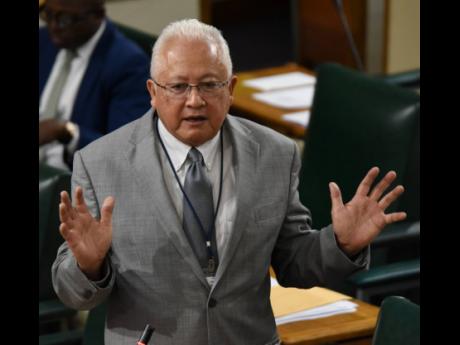‘Heads must roll’
Chuck, Calder call for accountability in Holness ruling controversy
Senior Cabinet minister Delroy Chuck is calling for swift action against the “responsible” person(s) at the Integrity Commission (IC) who caused the tabling of a report referring Prime Minister Andrew Holness for a corruption probe despite having prior knowledge of his exoneration.
On Thursday, Keisha Prince-Kameka, the director of corruption prosecution, ruled that no charges would be preferred against the prime minister.
The justice minister is not alone in his call for the sacking of commission officials as he has received support from Jeanette Calder, executive director of the Jamaica Accountability Meter Portal (JAMP).
The anti-corruption campaigner told The Gleaner Thursday evening that after the tabling of the investigation report on Tuesday, the ruling should have been published on the same day once the commission had complied with Section 53(3), often labelled the ‘gag clause’.
She has demanded that the anti-corruption watchdog conduct a probe into the presumed faux pas.
An incensed Chuck told The Gleaner that he was “extremely annoyed and disappointed that the Integrity Commission could allow a report to be tabled knowing full well that a month before the report exonerated the prime minister”.
Prince-Kameka’s ruling was dated January 12, 2023, while the investigation report by Kevon Stephenson was sent to Parliament on February 13 and tabled a day later. However, Parliament did not release the report until February 15.
The ruling was published on Thursday, February 16.
‘DELETERIOUS EFFECT’
“The Integrity Commission must be aware that this report would have a deleterious effect not only in Jamaica, but across the world. It must be obvious to them that the decision that would have made the report benign was available and then a day after an instruction was given by the commission’s chairman to release the decision,” Chuck said.
“It brings into question what could have happened and why a report was tabled when there is a decision on the report, and as far as I am concerned, heads must roll,” he insisted.
The justice minister said that Cabinet ministers and members of parliament are peeved by the commission’s action.
“I am very disappointed, and as far as I am concerned, heads must roll because what took place over the last two days where the reputation of the leader of this country was brought into disrepute, not only nationally but internationally, someone must take responsibility.”
Calder also questioned the anti-corruption body’s decision to tweet media reports on its website and social media regarding the report while having knowledge of the unpublished ruling.
The JAMP executive director said there had been communication “via the social-media timeline of the commission and there had been communication via the timeline of the executive director after it was tabled that did not suggest that they knew that the prime minister was exonerated”.
Calder also flagged the commission’s tweeting of a Gleaner article which said that the “PNP is appalled by the Holness conflict-of-interest allegation”.
“It is hard to believe that the Integrity Commission was making those posts knowing that the prime minister was not going to be put before the courts,” she said.
However, executive director of the commission, Greg Christie, said that once the director of investigations and the director of corruption prosecutions complete their report and ruling, respectively, they go to the commissioners the same day, most times within an hour.
Explaining the process, Christie said that once the investigative report has been completed, it is submitted to the commissioners through the executive director on the same day.
He said that he “is a conduit” and does not read reports and rulings preliminarily but hands them directly to the commissioners. Christie said that he read the Director of Investigations Kevon Stephenson-authored report on Holness for the first time on Wednesday.
Christie said that the commissioners instruct all the directors with the exception of the director of corruption prosecution.
Prince-Kameka also made a ruling in relation to a possible breach of Section 29 of the then Contractor General’s Act in which the Ministry of Education, the National Works Agency, and the Social Development Commission failed to submit quarterly contract reports of contracts awarded to Westcon Construction Limited to the then Office of the Contractor General.
Prince-Kameka ruled that although evidence has been identified sufficient to mount charges for the noted offences, the prosecution would be hard-pressed to resist the abuse of process application with regard to undue delay.
Turning to a recommendation that Dr Dwayne Vernon, head of the Social Development Commission, allegedly wilfully made a false statement to mislead the contractor general and, therefore, breached Section 29 of the Contractor General’s Act, the director of corruption prosecution said “the evidence does not reveal prima facie case with a realistic prospect of conviction in relation to the alleged offence, therefore, no criminal charges are being recommended in respect of this offence”.


